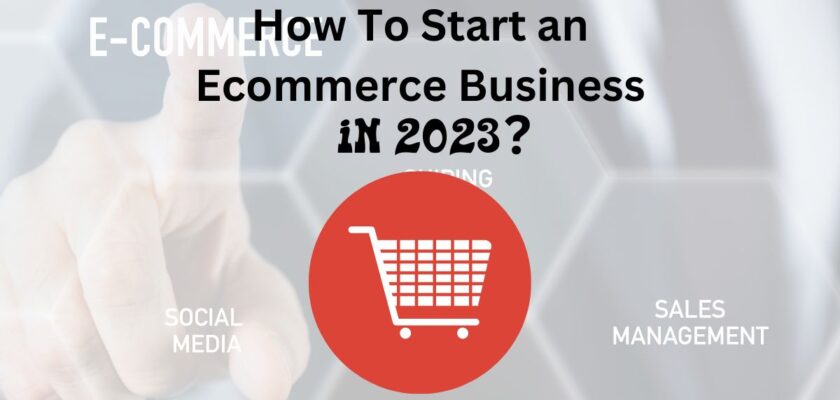What is ECommerce Business?
E-commerce Business , short for electronic commerce business, is the buying and selling of goods or services over the internet. E-commerce businesses operate online, through a website or mobile app, allowing customers to browse, purchase and pay for products or services from the comfort of their own home or on the go.
Starting an ecommerce business in 2023 can be a great way to tap into the growing online market and reach a global customer base. However, starting an ecommerce business is a complex process that requires careful planning and execution. From developing a business plan, researching the market and competition, choosing the right business structure and registering your business, to setting up an online store, sourcing or creating products, and developing a branding and marketing strategy.

It's important to be aware of the latest trends, techniques and technologies in the ecommerce industry, to help you make informed decisions and set your business up for success. This guide will walk you through the key steps you need to take to start and grow a successful ecommerce business in 2023.
Steps for Growing Your Ecommerce Business in a Better Way
Here are the some steps that help you to grow your business in a better way;
- Develop a business plan and research your market and competition
- Choose a business structure and register your business
- Set up an online store, source or create products, and develop branding and marketing strategy
- Test and launch your ecommerce store, optimize for SEO and Track your progress
Develop a business plan and research your market and competition:
Developing a business plan and researching your market and competition are crucial steps in starting an ecommerce business. They allow you to fully understand your industry and target market, identify opportunities and potential challenges, and develop a solid plan for achieving success.
When developing your business plan, it's important to start by outlining your business model, target market, and financial goals. This will give you a clear understanding of how you plan to generate revenue and what you need to do to reach your desired level of success. Additionally, you should include details about the products or services you plan to offer, your pricing strategy, and your marketing and advertising plans.
After you've completed your business plan, it's time to research your market and competition. This will give you a clear understanding of your industry, including the size of the market, the buying habits of your target customers, and the strengths and weaknesses of your competitors.
To research your market, you can conduct surveys and focus groups, as well as analyze data from industry reports and market research firms. You can also use tools like Google Trends and SEMrush to gain insight into industry trends and keyword data.
When researching your competition, you should pay particular attention to their strengths and weaknesses, as well as the products and services they offer. Look at their pricing, marketing, and advertising strategies and try to identify any gaps or opportunities in the market that you can exploit.
Overall , developing a business plan and researching your market and competition are essential steps in starting an ecommerce business. They give you the information you need to make informed decisions and develop a solid plan for achieving success. Additionally, it helps to communicate the value proposition to the potential investors or lenders, who will use this information to decide on investing or lending to your business.
Choose a business structure and register your business:
Choosing the right business structure and registering your business are important steps in starting an ecommerce business. The type of business structure you choose will have legal and tax implications for your company, so it's important to carefully consider your options and make an informed decision.
There are too many different types of business structures to choose from, including sole proprietorship, partnership, limited liability company (LLC), and corporation etc. Each structure has its own advantages and disadvantages and the right choice will depend on your individual circumstances.
A sole proprietorship is the simplest and most common type of business structure. It's easy to set up and has few formal requirements, but it also provides no personal liability protection for the owner.
A partnership is similar to a sole proprietorship, but it's owned and operated by two or more people. Partnerships provide more capital and resources, but also have more formal requirements and provide no personal liability protection for the partners.
A LLC is a hybrid structure that provides personal liability protection for the owners, known as members, like a corporation, but is taxed like a partnership. It also have more formal requirements to set up and operate than a sole proprietorship or partnership.
A corporation is a separate legal entity that provides personal liability protection for shareholders. It's the most complex type of business structure and also has the most formal requirements, including regular meetings and record keeping.
Once you've chosen your business structure, you will need to register your business with the state government. This typically involves filing articles of incorporation or a similar document and obtaining any necessary licenses and permits to operate your business.
In Short, Choosing the right business structure and registering your business are important steps in starting an ecommerce business. The type of business structure will have legal and tax implications for your company, so it's important to carefully consider your options. As well, registering your business will be necessary to operate legally and in compliance with the laws and regulations of your area.
Set up an online store, source or create products, and develop branding and marketing strategy:
Setting up an online store, sourcing or creating products, and developing a branding and marketing strategy are all essential steps in starting an ecommerce business. They are closely interconnected and will help you to establish a strong online presence, attract customers and generate revenue.
When setting up an online store, you will need to choose an ecommerce platform to build and host your store. There are many different options available, such as Shopify, Magento, and WooCommerce, each with its own set of features and capabilities. It's important to choose a platform that is easy to use, has the necessary features for your business, and is scalable to grow with your business.
Once your online store is set up, you will need to source or create products to sell. You can either create your own products or purchase them from wholesalers or manufacturers. When sourcing products, it's important to consider factors such as quality, price, and lead time.
After you have your products, you will need to develop a branding and marketing strategy to promote your ecommerce business and attract customers. This will involve creating a brand identity and developing a marketing plan that includes tactics such as search engine optimization (SEO), social media marketing, email marketing, and pay-per-click advertising (PPC).
Your branding and marketing strategy should also focus on building a relationship with your customers, providing excellent customer service, and creating a positive online reputation. Additionally, it should be aligned with the target market you defined in the business plan.
In Short, Setting up an online store, sourcing or creating products, and developing a branding and marketing strategy are all essential steps in starting an ecommerce business. These steps will help you establish a strong online presence, attract customers, and generate revenue. It is important to choose the right ecommerce platform, have a good strategy for sourcing products, and effectively communicate your brand to attract and retain customers.
Test and launch your ecommerce store, optimize for SEO and Track your progress:
Testing and launching your ecommerce store, optimizing for search engine optimization (SEO) and tracking your progress are all important steps in starting an ecommerce business. They will help you ensure that your store is fully functional, customer-friendly and able to generate revenue.
Before launching your ecommerce store, it's important to thoroughly test it to ensure that it's fully functional and that there are no issues. This should include testing the checkout process, payment gateway, and any other key features of your store. It's also important to test your store on different devices and browsers to ensure that it is responsive and accessible to all users.
Once you've tested and addressed any issues, you can launch your store to the public. This is an exciting time, but it's also important to remember that the work doesn't stop here. To ensure the long-term success of your ecommerce business, you will need to continuously optimize your store for SEO.
SEO is the process of optimizing your store's design, layout, and content for search engines to increase the visibility of your store and products. This includes optimizing your store's structure, meta tags, keywords, images, and content. By focusing on SEO, you can drive more traffic to your store and improve your search engine rankings.
Finally, it's important to track your progress and monitor the performance of your ecommerce business. This includes monitoring your traffic, conversion rates, sales, and customer satisfaction. By tracking these key metrics, you can identify areas that need improvement and make necessary adjustments to grow your business.
Grow your online reach and drive conversions with our SEO-optimized website design and development services.
In Short, Testing and launching your ecommerce store, optimizing for SEO, and tracking your progress are all important steps in starting an ecommerce business. These steps will help you ensure that your store is fully functional, customer-friendly, and able to generate revenue. Additionally, by monitoring and analyzing the performance metrics, you can continuously improve your store, attract more customers and scale the business.
Conclusion
Starting an ecommerce business can be a complex and challenging process, but by following the key steps outlined in this article, you can set yourself up for success.
Developing a business plan and researching your market and competition are vital steps in gaining a deep understanding of your industry and target market, as well as identifying opportunities and potential challenges. Choosing the right business structure and registering your business will help you comply with the legal and tax requirements. Setting up an online store, sourcing or creating products, and developing a branding and marketing strategy are essential steps to establish a strong online presence and attract customers. Testing and launching your store, optimizing for SEO, and tracking your progress will help you ensure that your store is fully functional and able to generate revenue.
By following these steps and continuously monitoring and adjusting your strategy, you can start and grow a successful ecommerce business.




